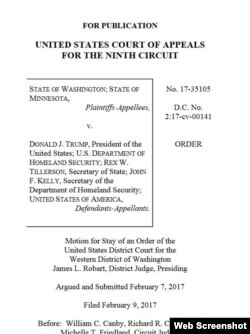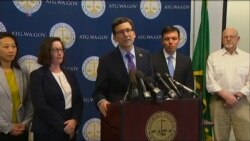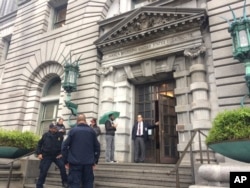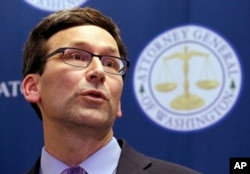A federal appeals court Thursday refused to reinstate President Donald Trump's ban on travelers from seven predominantly Muslim nations.
9th Circuit Court of Appeals ruling
The 9th Circuit Court of Appeals ruling on President Donald Trump's travel ban.
The three-judge panel from the 9th U.S. Circuit Court of Appeals in San Francisco unanimously declined to block a lower-court ruling that suspended the ban and allowed previously barred travelers to enter the United States.
"We hold that the government has not shown a likelihood of success on the merits of its appeal, nor has it shown that failure to enter a stay would cause irreparable injury," a statement issued by the appeals court panel said.
The Justice Department said that it was "reviewing the decision and considering its options," following the announcement.
In its ruling, the appeals court said the government presented no evidence to explain the urgent need for the executive order to take effect immediately.
The judges noted compelling public interests on both sides. "On the one hand, the public has a powerful interest in national security and in the ability of an elected president to enact policies.
"And on the other, the public also has an interest in free flow of travel, in avoiding separation of families, and in freedom from discrimination," they ruled.
"We hold that the government has not shown a likelihood of success on the merits of its appeal, nor has it shown that failure to enter a stay would cause irreparable injury," a statement issued by the appeals court panel said.
“See you in court, the security of our nation is at stake,” the president tweeted shortly after the court announced its decision. A short time later, he complained to reporters at the White House that the court made a "political decision," and said his administration eventually will win the case "very easily."
In response to Trump's tweet, Washington Governor Jay Inslee, a Democrat who leads one of the states that challenged the ban, said: "Mr. President, we just saw you in court, and we beat you."
President Trump revisited the court decision Friday morning on Twitter. He chastised the court for not citing the statute in question in its written opinion.
At a news conference in Seattle, Bob Ferguson, the attorney general for the state of Washington, which argued against restoring the Trump travel ban, said, “We are a nation of laws, and ... those laws apply to everybody in our country, and that includes the president of the United States. In my view, the future of the Constitution is at stake.”
When asked to respond to the latest Trump tweet, he noted that opponents are now two-for-two in challenging the Trump administration’s ban in the courts.
WATCH: Washington Attorney General Bob Ferguson
Ferguson said the president's ban had real human consequences, and he denied he is pursuing the case as a Democrat versus a Republican president.
Seattle judge
Last week, District Judge James Robart in Seattle issued a temporary restraining order halting the ban after the states of Washington and Minnesota sued.
After Robart issued his ruling, President Trump responded angrily on Twitter, calling Robart a “so-called judge” who made a "ridiculous" decision that will allow "many very bad and dangerous people into our country."
During oral arguments Tuesday, the judges heard arguments from a lawyer for the Justice Department and an attorney representing the states of Washington and Minnesota, which sued to overturn the ban.
U.S. attorney August Flentje argued that Trump's executive order was well within his power granted by Congress and the Constitution.
However, the judges rejected the administration's lawyers, who claimed the court did not have the authority to review the president's executive order.
"There is no precedent to support this claimed unreviewability, which runs contrary to the fundamental structure of our constitutional democracy," the court said.
Washington state Solicitor General Noah Purcell said on Tuesday the travel ban reinstating the travel ban without a full judicial review would throw the country "back into chaos."
He also said the ban had separated families, stranded students overseas, and left people in doubt about whether they should travel because of the uncertainty of whether they could come back.
Watch: Appeals Court Panel Refuses to Reinstate Trump Travel Ban
Washington ruling
Robart temporarily halted the ban after determining that the states were likely to win the case and had shown that the ban would restrict travel by their residents, damage their public universities and reduce their tax base. The judge put the executive order on hold while the lawsuit works its way through the courts.
Soon after his ruling, the State Department said people from the seven countries -- Iran, Iraq, Libya, Somalia, Sudan, Syria and Yemen -- with valid visas could travel to the U.S. The decision led to tearful reunions at airports around the country.
The federal government could ask the 9th Circuit to have a larger panel of judges review the decision, or it could appeal directly to the U.S. Supreme Court.
Supreme Court
In appealing to the Supreme Court, the administration would need five of the eight justices to vote in its favor.
However, the court is currently evenly divided 4-4 between liberals and conservatives. If the Supreme Court justices were to tie 4-4 in its decision, the lower court’s ruling would stand.
Trump’s ban was set to expire in 90 days, meaning it could run its course before the high court can take up the issue. The administration also could change the order, including altering its scope or duration.
The president said the order was vital for national security. But critics said the ban discriminated against Muslims, and they questioned its value as a security measure.
National security veterans, major U.S. technology companies and law enforcement officials from more than a dozen states backed the legal effort against the ban.










